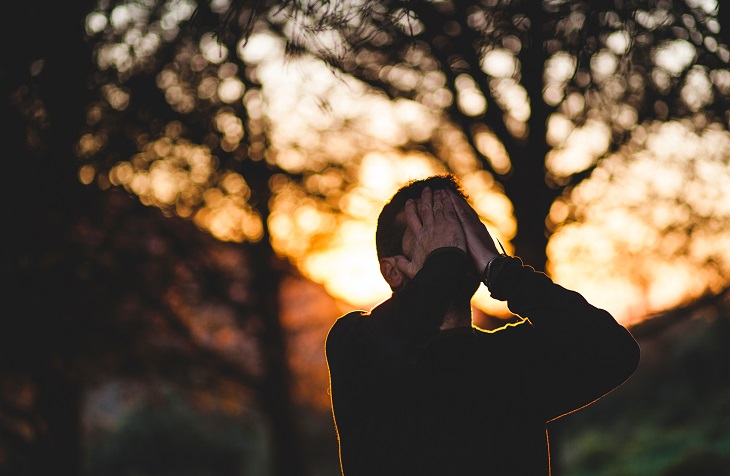THE DAILY DOSE
How Anxiety Can Influence Energy Levels

If you experience short-term or chronic anxiety, you’re likely familiar with how it feels when an attack is happening. It may come on slow and begin to build rapidly. Your heart begins to race and your breathing quickens. During this time, your body goes through several different processes, all of which consume energy. This is why people often feel exhausted after a bout of anxiety or stress.
Many people may feel the mental anguish of a stressful situation causes tiredness. However, there’s more going on beneath the surface that causes fatigue following an attack of anxiousness. But what does anxiety do to the body, and how does it affect how much energy you have? Read on to learn how anxiety can influence energy levels.
What does anxiety do to the body?
Anxiety is an intense feeling of dread, worry, or impending doom. It can occur sporadically because of stressful events. It can also be chronic, as is the case with anxiety disorders. In many cases, people feel anxiety in entirely safe situations, where nothing specific is triggering the feelings.
When the brain thinks there is a threat, hormones are released from different areas such as the pituitary gland, adrenal glands, and hypothalamus. These hormones prepare you to fight or flee the perceived danger. When those hormones are released, they trigger physical symptoms that can include:
- Shaking
- A faster heart rate
- Chest pain
- Shallow and rapid breathing
- Dry mouth
- Muscle tension
- Nausea
- Diarrhea
- Dizziness
These physical symptoms all contribute to the fatigue people feel after experiencing a bout of anxiety. However, if stress is constant or occurs more often, that tiredness can stick around even after rest.

How can anxiety affect a person’s ability to function?
Because of the physical symptoms above, a person’s ability to participate in regular activities during a bout of anxiety can be near impossible. Every system in the body is affected differently.
Central nervous system
The release of hormones during anxiety and stress increases symptoms such as headaches, dizziness, and depression. That is because the nervous system becomes flooded with the hormones and chemicals that are released to help deal with a specific threat.
Cardiovascular system
The cardiovascular symptoms arising during bouts of anxiety put stress on your heart muscle. That can increase a person’s risk of developing heart disease and high blood pressure. Some chest pain associated with anxiety may even feel like a heart attack, prompting people to visit a hospital.
Digestive system
The digestive system can get thrown out of balance because of anxiety. Stomach aches, nausea, and diarrhea are all common symptoms of anxiety, meaning day-to-day living can be disrupted severely. Dealing with gastrointestinal issues can also sap your energy.
Immune system
The flood of chemicals released during anxiety also affects the function of the immune system. Constant stress can leave a person with a weakened immune system that cannot fight off pathogens as well as it should. With a weaker immune system and more risk of sickness, you are likely to feel more tired if you catch a common cold or other illness.
Sleep
If you aren’t getting enough quality sleep, you will not be able to function at your best. Long-term anxiety can negatively affect your sleeping patterns, sometimes leading to insomnia. Insomnia and other sleep issues such as the inability to stay asleep throughout the night can, over time, cause a person to feel chronically tired.
The issue with sleep and anxiety is that the two can be codependent. That means that one can cause the other and vice versa. If it goes on long enough, this cycle will lead to severe tiredness in people with chronic anxiety.

What does anxiety fatigue feel like?
There are two ways that anxiety can cause a person to feel tired all the time. The first is sleep-related, and the second is known as anxiety fatigue.
Fatigue is mental or physical tiredness that does not go away. People with fatigue often feel weak, unmotivated, and as if they need sleep throughout the day. Anxiety fatigue is fatigue brought on by anxiety.
Some symptoms that you can experience if you have anxiety fatigue include:
- Brain fogginess
- Inability to concentrate or finish a thought
- Poor memory
The little things that you do daily can feel highly taxing, and it’s hard to escape those feelings if you have anxiety that continues every day. Eventually, stress and anxiety may lead to chronic fatigue syndrome, a condition marked by excessive fatigue that will not go away.
How can you restore your energy levels?
To address fatigue caused by anxiety, you have to take it step by step. The first thing you will want to do is manage your stress and seek treatment. You should also adopt specific lifestyle changes. To help curb anxiety’s effects while undergoing treatment, you can:
- Develop bedtime and wake-up routines to get into a good cycle of sleep
- Engage in some form of exercise every day
- Try meditation to reduce the overall levels of stress hormones in your bloodstream
Anxiety isn’t easy to deal with, and neither is being tired all the time. The best thing you can do for both is address your anxiety head-on and get the proper treatment and lifestyle practices in place.
Featured image by Abbie Bernet on Unsplash